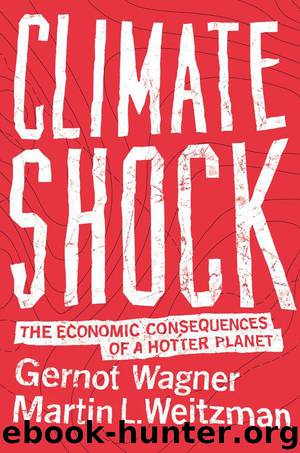Climate Shock: The Economic Consequences of a Hotter Planet by Wagner Gernot & Weitzman Martin L

Author:Wagner, Gernot & Weitzman, Martin L. [Wagner, Gernot]
Language: eng
Format: azw3
Publisher: Princeton University Press
Published: 2015-02-21T16:00:00+00:00
None of that yet includes the truly frightening low-probability events. There’s a huge difference between a likely sea-level rise of 0.3 to 1 meters (1 to 3 feet) by the end of this century and eventual possible extremes of 20 meters (66 feet) or more in future centuries. And it’s debatable whether we can describe any of these extreme scenarios as “unlikely” or “low probability” to begin with. By our own, conservative calculations, there’s about a 1-in-10 chance of eventual global average warming in excess of 6°C (11°F), something that can be described only as “catastrophic” for society as we know it.
Any such talk of inevitability engenders calls of alarmism. It’s anything but. We see it as our obligation to paint the full picture of what we know, and to show how what we don’t know might play out. We take no satisfaction in doing so. We can only hope that we are wrong.
WRONG, THRICE OVER
First, we hope we are wrong in the sense that the really bad low-probability events will never come to fruition.
Second and more importantly, we hope we are wrong because society will manage to steer the climate ship away from the proverbial iceberg by severely cutting the flow of carbon into the atmosphere. There’s plenty of warming and sea-level rise, and there are more floods, more droughts, and more of all sorts of other weather extremes already baked in, but rapid action can help deter the worst predictions.
Third, we hope we are wrong about the seemingly unstoppable drive toward geoengineering: shooting sulfur or other particles into the stratosphere to create an artificial sun shield. Everything we know about the economics tells us that the same fundamental forces that make it difficult to do much about climate change in the first place make it likely that we are going to face a geoengineered planet at some point, and possibly one geoengineered in some “rogue” fashion. The climate problem is too big, and it has too much momentum, while the geoengineering technology is too cheap and too readily available.
Our hope is that we will be proven wrong on all three counts. The world gets lucky on the science, works out the seemingly intractable politics of cutting emissions, and comes up with an iron-clad governing mechanism to guide geoengineering research into a productive direction and away from the seeming near-inevitability of (rogue) geoengineering.
STICK IT TO CARBON
It would be easy to conclude that economics—capitalism—is the problem. Economics is indeed at the core of the problem. Or rather: misguided market forces are.
One seeming solution then would be to simply change our ways. If only we slowed down, went back to the land, and generally did more with less, climate change would be a thing of the past. Not quite. Most would like to spend more time with our families frolicking in fields of green and less time tied to our desks. But that’s clearly not enough. The math on voluntary action simply doesn’t add up. And the calculus of changing capitalism
Download
This site does not store any files on its server. We only index and link to content provided by other sites. Please contact the content providers to delete copyright contents if any and email us, we'll remove relevant links or contents immediately.
The Secret History by Donna Tartt(19088)
The Social Justice Warrior Handbook by Lisa De Pasquale(12190)
Thirteen Reasons Why by Jay Asher(8909)
This Is How You Lose Her by Junot Diaz(6887)
Weapons of Math Destruction by Cathy O'Neil(6280)
Zero to One by Peter Thiel(5802)
Beartown by Fredrik Backman(5754)
The Myth of the Strong Leader by Archie Brown(5507)
The Fire Next Time by James Baldwin(5445)
How Democracies Die by Steven Levitsky & Daniel Ziblatt(5218)
Promise Me, Dad by Joe Biden(5153)
Stone's Rules by Roger Stone(5088)
A Higher Loyalty: Truth, Lies, and Leadership by James Comey(4964)
100 Deadly Skills by Clint Emerson(4925)
Rise and Kill First by Ronen Bergman(4789)
Secrecy World by Jake Bernstein(4753)
The David Icke Guide to the Global Conspiracy (and how to end it) by David Icke(4719)
The Farm by Tom Rob Smith(4509)
The Doomsday Machine by Daniel Ellsberg(4490)
